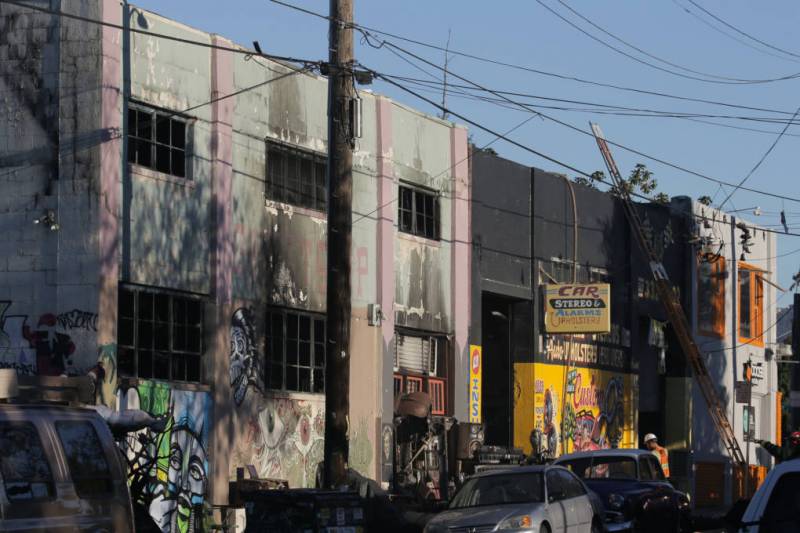State Sen. Nancy Skinner on Monday introduced legislation designed to promote safety in California live-work and warehouse residences while protecting tenants from displacement.
State Senator Introduces Legislation to Protect Live-Work and Warehouse Residences

Senate Bill 906, co-sponsored by the City of Oakland, would give property owners more time to correct non-life-threatening violations that could otherwise motivate them to evict tenants, and also update state live-work code that effectively outlaws many communal residences.
The legislation aims to support live-work and warehouse residences popular among artists and musicians. The Dec. 2016 Ghost Ship fire that killed 36 at an unpermitted warehouse venue and residence in East Oakland brought intense scrutiny to such alternative cohousing spaces, prompting many property owners to displace tenants instead of addressing substandard conditions.
Skinner, who represents the 9th Senate District in the East Bay, said in a statement that current law gives California cities little flexibility to work with property owners and tenants in such situations. Officials often have a difficult choice between red-tagging buildings, forcing eviction; mandating upgrades that render the housing unaffordable for current tenants; or ignoring potentially hazardous conditions.
“California’s housing crisis demands that we give cities the tools they need to protect existing housing while making it safer, especially live-work and warehouse spaces,” Skinner said. “SB 906 is a necessary tool to protect and retain live-work and warehouse residences.”
Oakland Mayor Libby Schaaf and Oakland City Council President Rebecca Kaplan also offered statements supporting the legislation for fostering collaboration between city officials and property owners. This legislation, if passed, could help continue Oakland’s legacy of communal artist housing and workspace.
The proposed bill amends one section of California’s health and safety code and adds another.
The amendment removes what Skinner and live-work advocates call a woefully outdated restriction on the number of residents allowed to share “joint living and working quarters” (currently, four unrelated persons). The addition allows owners of buildings deemed code-deficient to request an enforcement delay of as many as seven years if the violations don’t threaten building occupants’ health and safety.
Oakland live-work architect Thomas Dolan, who co-founded the advocacy group Safer DIY Spaces after the Ghost Ship fire, said in an interview that removing the state limit on live-work residents would help clear a path to legalization for many spaces he’s visited as a consultant.
However, Dolan also urged Oakland city officials to reinstate a more comprehensive municipal live-work code they removed after the Ghost Ship fire; Dolan helped author the code. “That’s putting a dead stop on DIY’s ability to do its job,” he said of its removal.
Currently any live-work space with more than four residents must pursue a conditional-use permit to exceed the state limit, an expensive and costly process with no guarantee of success. Safer DIY Spaces director David Keenan said such a permit should be unnecessary: “It should be by-right, if we believe housing is a human right.”
Dolan also supports SB 906’s efforts to ease the way for property owners to correct non-life-threatening building violations for the sake of retaining affordable housing for current tenants. Oakland already has a similarly aimed “compliance plan” program, he pointed out, that would be strengthened in tenants’ favor by increasing the amount of time property owners have to address violations.
Dolan points out that the legislation doesn’t draw a clear distinction between habitability issues, for example, a window slightly narrower than modern building standards require, and immediate life-safety risks. “Life safety no one should compromise on—that needs immediate addressing,” Dolan said. “But the nuance between that and a habitability shortcoming is being overlooked here.”
Oakland is recognized as a hub of commercial and warehouse property adapted by artists for residential, performance and fabrication purposes. But climbing rent and competition for commercial space have in recent years threatened the often unspoken agreements between landlords and residential tenants of buildings not technically approved or suitable for residential habitation.
The Dec. 2016 Ghost Ship warehouse fire, which broke out during an electronic music event, intensified pressure on unpermitted live-work and warehouse residences. Oakland officials identified unpermitted residences and instructed many owners to “discontinue residential use,” even in the absence of life-threatening conditions. Other property owners moved to evict warehouse tenants proactively amid the possibility of civil liability for Ghost Ship’s landlord, Chor Ng.
“Oakland has a long and proud history of fostering affordable joint living and work spaces, especially for our vibrant arts and maker communities,” Schaaf, the mayor of Oakland, said in a statement. “But as a city, we must also ensure that people have safe, affordable housing, and are not forced onto the streets and into homelessness.”

